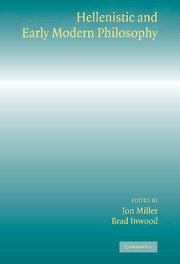Book contents
- Frontmatter
- Contents
- List of Abbreviations
- Notes on Contributors
- Preface
- Introduction
- 1 Stoicism in the Philosophical Tradition
- 2 Early Modern Uses of Hellenistic Philosophy
- 3 Locke's Offices
- 4 Patience sans Espérance: Leibniz's Critique of Stoicism
- 5 Epicureanism in Early Modern Philosophy
- 6 Stoics, Grotius, and Spinoza on Moral Deliberation
- 7 The Discourse on the Method and the Tradition of Intellectual Autobiography
- 8 Subjectivity, Ancient and Modern
- 9 Spinoza and Philo
- 10 Hume's Scepticism and Ancient Scepticisms
- 11 Stoic Naturalism in Butler
- Bibliography of Primary Sources
- Bibliography of Secondary Sources
- Index (general)
- Index (of selected text passages)
9 - Spinoza and Philo
The Alleged Mysticism in the Ethics
Published online by Cambridge University Press: 05 August 2012
- Frontmatter
- Contents
- List of Abbreviations
- Notes on Contributors
- Preface
- Introduction
- 1 Stoicism in the Philosophical Tradition
- 2 Early Modern Uses of Hellenistic Philosophy
- 3 Locke's Offices
- 4 Patience sans Espérance: Leibniz's Critique of Stoicism
- 5 Epicureanism in Early Modern Philosophy
- 6 Stoics, Grotius, and Spinoza on Moral Deliberation
- 7 The Discourse on the Method and the Tradition of Intellectual Autobiography
- 8 Subjectivity, Ancient and Modern
- 9 Spinoza and Philo
- 10 Hume's Scepticism and Ancient Scepticisms
- 11 Stoic Naturalism in Butler
- Bibliography of Primary Sources
- Bibliography of Secondary Sources
- Index (general)
- Index (of selected text passages)
Summary
Let me begin this chapter with a simple categorical statement: There is no mysticism in Spinoza's philosophy. To most careful readers of the Ethics, such an assertion should seem unsurprising, if not obvious; Spinoza's place in the pantheon of arch-rationalist philosophers would seem to be as secure as that of his seventeenth-century mentor, Descartes. Thus, I do not claim that the thesis of this chapter is particularly bold or even novel. And yet it seems still to stand in need of demonstration. For from the earliest commentators on his work down to the most recent scholarship – and especially including the representation of Spinoza in the popular imagination – there has persisted a significant trend in which Spinoza is seen not as the inheritor of the Cartesian devotion to clear and distinct reasoning, nor of the Jewish intellectualist tradition of Maimonides and Gersonides, but as the descendent of the mysticism of Philo of Alexandria and of the later kabbalists.
At the end of the seventeenth-century, for example, it was not uncommon to see Spinoza's philosophy as deeply imbued with kabbalistic and occult themes. In the eighteenth-century, Jacques Basnage, in his grand Histoire des Juifs, depuis Jesus Christ jusqu'à prèsent (1705), included Spinoza in his discussion of kabbalah, which he sees as the source of his “obscure and mystical” ideas. Later that century, Solomon Maimon asserted that “kabbalah is nothing but extended Spinozism,” an opinion that the great twentieth-century scholar of Jewish mysticism, Gershom Sholem, would later second.
- Type
- Chapter
- Information
- Hellenistic and Early Modern Philosophy , pp. 232 - 250Publisher: Cambridge University PressPrint publication year: 2003

